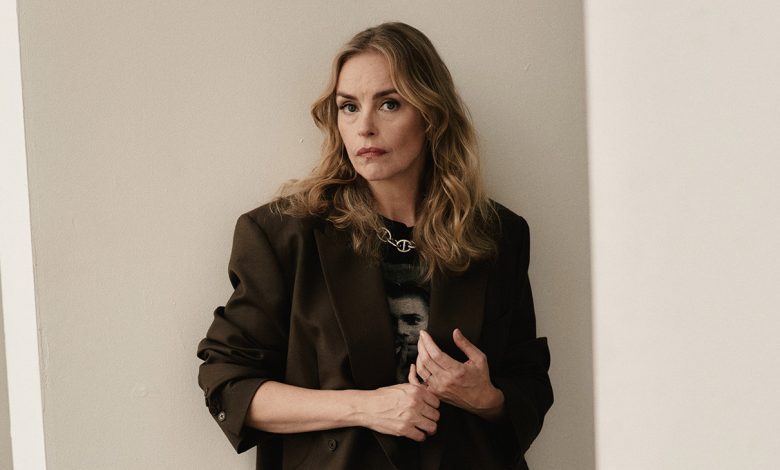Nina Hoss Interview: ‘Heda’ Queer Adaptation

About 15 years ago, Nina Hoss played Hedda Gabler in an experimental stage production in Berlin. This take on the eponymous Henrik Ibsen classic opened in the 19th century, when the play was written, before hurtling toward the present as the story progressed. Hedda’s circumstances — stuck in a bad marriage, faced with the return of an old lover — turned less beholden to the time, more universal in their discontents. The production’s central question, as Hoss describes it: “Why can’t I free myself from these expectations that have nothing to do with me?”
Hoss played the role a few times each month, per the German theatrical tradition. Then her acting career took off outside of her home country and on the global stage: Her tour de force in Christian Petzold’s 2014 film Phoenix netted her awards around the world, and roles in such popular American TV series as Homeland and Jack Ryan soon followed. Her casting in this year’s audacious, cinematic Hedda adaptation feels full-circle — especially since her role, as our antiheroine’s former lover, is the most radically upended from the original. Finally, a Hedda Gabler that’s queer as hell.
“I read the script and I was like, ‘How come no one ever thought about doing this?’ ” Hoss says from a restaurant in Middleburg, Virginia, where she was just honored as part of Hedda‘s splashy fall festival run. “I was so surprised because it would be such a German thing to do!”
Nia DaCosta, the film’s writer-director, may not have much experience with German theater — but she’s evidently in close alignment with Hoss and her countrypeople. “We’re not afraid of touching holy material and interpreting it and making it modern without destroying it — well, sometimes destroying it, but we won’t talk about those,” Hoss says with a grin. “It’s a risk. It’s an endeavor.”
DaCosta’s Hedda, distributed by Amazon MGM Studios with the backing of Plan B and now streaming on Prime Video, stars Tessa Thompson in the title role and takes place in 1950s England. The action is confined to the country estate where Hedda and her academic husband, George (Tom Bateman), throw a decadent party that masks their unhappiness. Hedda has settled with a man she does not love for status, while George has overshot his ambitions and needs to win an open professor job to pay off their debts. The plan is complicated by the arrival of Hoss’ Eileen, who is now romantic with Hedda’s old friend Thea (Imogen Poots) — and angling for the professorship.
As with the original text’s Eilert, Eileen is a recovering alcoholic who’s got unfinished business with Hedda. But the similarities end there. Hoss arrives 30 minutes into the action, DaCosta staging her entrance like a movie star crashing the literal party. An elaborate dolly shot tracks Hedda noticing Eileen’s arrival, thrilled and horrified and maybe turned on all at once. “It was such a glorious moment to get gifted something like that — it was a bit like the old days of film,” Hoss says. “Once or twice in life, you get that.”
Except that may go for the rest of the film, too. Hoss’ performance is volcanic, a showcase of her extraordinary range as few movies have been able to contain. Hedda’s manipulations, fueled by jealousy and sadness and flirtation, lead Eileen to fall apart during the course of the night. She has a drink. She loses her manuscript, the key to her scholarly future and to getting that job. She blows up her relationship with Thea. But Hoss’ approach isn’t maudlin or despairing — it’s full of life, matching Thompson’s seductive energy and wholly in sync with DaCosta’s sexy, sweaty vision.

Tessa Thompson, Hoss and Imogen Poots in Nia DaCosta’s film adaptation.
Parisa Taghizadeh/Amazon
“She’s funny, she’s devastated — Eileen goes through every emotion there is, and I found it so relatable,” Hoss says. “I was trying to balance making her joyous to watch in her downfall, but also keeping it real and not overpowering the screen. I still want people to try to go toward her, to try to understand her — but uninhibited.” DaCosta throws the Ibsen structure out the window by essentially handing a section of the movie to Hoss, as Eileen drunkenly describes her manuscript’s theories of the future of sex to a group of men. “She becomes more and more honest and doesn’t care anymore,” Hoss says. The actress wasn’t aware of DaCosta’s plan to devote so much of Hedda‘s real estate to her — that happened in the edit. “I didn’t know,” says Hoss. “I’m obviously very happy about it. I just thought, ‘I have the chance to show a whole role.’ “
That she got to develop it opposite Thompson, who offers a completely different take on Hedda than Hoss’ from 15 years ago, made the experience all the sweeter. “She did such a great job in making her mesmerizing, with this particular way of talking — someone who keeps people at distance at all times, but you really want to be close,” Hoss says of her co-star. “It’s these people that are not good for you, but there’s adventure, there’s something radical going on. To see how she embodied that, how she brought that out of this character — wow.”
Though she’s been a decorated star on the international scene for decades, only recently has Hoss been welcomed into the full-fledged American film-awards machine. Hedda was difficult to get made, outlasting pauses induced by the writers and actors strikes. And so Hoss has felt heartened by conversations with moviegoers for weeks, as her film has gone from Toronto to London to Virginia, with many more stops on the way.
“Culture is under pressure, and so I’m all in, because I think it is necessary for all of us to talk with each other — to talk to the people who watch what you’re doing. That’s something to make people keep the interest up,” Hoss says. “Having this communal experience together while listening to a story — yeah, I do believe in that. Honestly, even more now than ever, because it creates empathy.”
Hoss’ first go-round on the awards circuit was with Tár, the critical darling helmed by Todd Field for which Hoss received Spirit and Gotham award nominations. She played Cate Blanchett’s enigmatic wife and found the Oscar winner a crucial guide through the wildness of an awards campaign.
“It was always on the coattails of Cate, and she’s so brilliant at it. I had never done it, so I had the best person in front of me, showing when to retreat and just the rhythm and the movement of it all,” Hoss says. “Now it’s a bit different, and sometimes it’s very stressful because you meet so many people. The energy — that is kind of like, whoa. How to cope with that? But I do enjoy talking about the work.”
And Tár — both her performance and the world tour that followed its release — did put Hoss on the map in a new way. Or maybe, a rather specific way: “I didn’t think too much about it, but I must say I get more of those [queer] roles coming my way,” she says with a laugh. “After Tár for sure. It’s like you play the violin once and, ‘Oh, she should play the violin!’ It’s a little bit the laziness of directors and producers to go, ‘She probably can do that,’ instead of thinking out of the box.” She clarifies: “And I am not complaining, because I love all of these characters.”
Indeed, Hoss speaks with reverence of the way DaCosta remixed Hedda for a modern audience. “Watching it, I never have the feeling I’m being lectured about any experience — not as a Black woman, not as a queer woman — it’s just there for you to see if you are looking for it,” Hoss says. “You always see the little signs.”
In a tough period for the industry, she beams with pride at the movie’s very existence — and its backing from a big studio. “I do believe in material,” she says. “If the material is great, you get it done.” Of course, it helps to have a great actor, too.
HiCelebNews online magazine publishes interesting content every day in the movies section of the entertainment category. Follow us to read the latest news.





